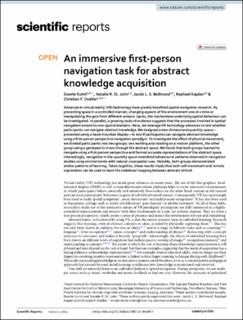| dc.contributor.author | Kuhrt, Dörte | |
| dc.contributor.author | St.John, Natalie R | |
| dc.contributor.author | Bellmund, Jacob L.S. | |
| dc.contributor.author | Kaplan, Raphael | |
| dc.contributor.author | Doeller, Christian Fritz Andreas | |
| dc.date.accessioned | 2021-09-01T12:14:53Z | |
| dc.date.available | 2021-09-01T12:14:53Z | |
| dc.date.created | 2021-01-11T11:04:46Z | |
| dc.date.issued | 2021 | |
| dc.identifier.issn | 2045-2322 | |
| dc.identifier.uri | https://hdl.handle.net/11250/2772264 | |
| dc.description.abstract | Advances in virtual reality (VR) technology have greatly benefited spatial navigation research. By presenting space in a controlled manner, changing aspects of the environment one at a time or manipulating the gain from different sensory inputs, the mechanisms underlying spatial behaviour can be investigated. In parallel, a growing body of evidence suggests that the processes involved in spatial navigation extend to non-spatial domains. Here, we leverage VR technology advances to test whether participants can navigate abstract knowledge. We designed a two-dimensional quantity space—presented using a head-mounted display—to test if participants can navigate abstract knowledge using a first-person perspective navigation paradigm. To investigate the effect of physical movement, we divided participants into two groups: one walking and rotating on a motion platform, the other group using a gamepad to move through the abstract space. We found that both groups learned to navigate using a first-person perspective and formed accurate representations of the abstract space. Interestingly, navigation in the quantity space resembled behavioural patterns observed in navigation studies using environments with natural visuospatial cues. Notably, both groups demonstrated similar patterns of learning. Taken together, these results imply that both self-movement and remote exploration can be used to learn the relational mapping between abstract stimuli. | en_US |
| dc.language.iso | eng | en_US |
| dc.publisher | Nature Research | en_US |
| dc.rights | Navngivelse 4.0 Internasjonal | * |
| dc.rights.uri | http://creativecommons.org/licenses/by/4.0/deed.no | * |
| dc.title | An immersive first-person navigation task for abstract knowledge acquisition | en_US |
| dc.type | Peer reviewed | en_US |
| dc.type | Journal article | en_US |
| dc.description.version | publishedVersion | en_US |
| dc.source.journal | Scientific Reports | en_US |
| dc.identifier.doi | http://dx.doi.org/10.1038/s41598-021-84599-7 | |
| dc.identifier.cristin | 1868733 | |
| cristin.ispublished | false | |
| cristin.fulltext | preprint | |
| cristin.qualitycode | 1 | |

